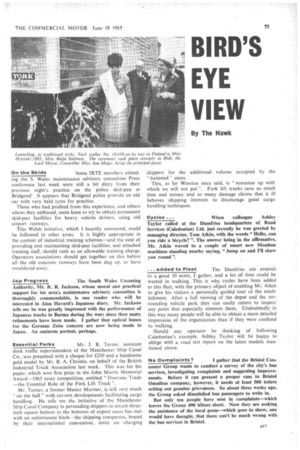BIRD'S EYE VIEW
Page 77

If you've noticed an error in this article please click here to report it so we can fix it.
By The Hawk On the Skids Some IRTE members attend
ing the S. Wales maintenance advisory committee Press conference last week were still a bit dizzy from their previous night's practice on the police skid-pan at Bridgend! It appears that Bridgend police provide an old car with very bald tyres for practice.
Those who had profited from this experience, and others whom they enthused, seem keen to try to obtain permanent skid-pan facilities for heavy vehicle drivers, using old airport runways.
This Welsh initiative, which I heartily commend, could be followed in other areas. It is highly appropriate in the context of industrial training schemes—and the cost of providing and maintaining skid-pan facilities, and attached training staff, should rank as an allowable training charge. Operators associations should get together on this before all the old concrete runways have been dug up. or have mouldered away.
Jap Progress The South Wales licensing
Authority, Mr. R. R. Jackson, whose moral and practical support for his area's maintenance advisory committee is thoroughly commendable, is one reader who will be interested in Alan Havard's Japanese diary. Mr. Jackson tells me he was greatly impressed with the performance of Japanese trucks in Burma during the war; since then many refinements have been made. I gather that optical lenses for the German Zeiss concern are now being made in Japan. An ominous portent, perhaps.
Essential Forks Mr. J. R. Turner. assistant
dock traffic superintendent of the Manchester Ship Canal Co., was presented with a cheque for £250 and a handsome gold medal by Mr. B. A. Christie, on behalf of the British Industrial Truck Association last week. This was for his paper, which won first prize in the John Morris Memorial Award-1965 essay competition, entitled "Overseas Trade —the Essential Role of the Fork Lift Truck Mr. Turner. a former Master Mariner, is still very much on the ball" with current developments facilitating cargo handling. He tells me the initiative of the Manchester Ship Canal Company in persuading shippers to attach threeinch square battens to the bottoms of export cases has met with an unfortunate hitch—the shipping companies, bound by their international convention, insist on charging shippers for the additional volume occupied by the " battened " cases.
This, as Sir Winston once said, is "nonsense up with which we will not put ''. Fork lift trucks save so much time and money and so many damage claims that it ill behoves shipping interests to discourage good cargo handling techniques.
Cycles ... When colleague Ashley
Taylor called at the Dumfries headquarters of Road Services (Caledonian) Ltd. just recently he was greeted by managing director, Tom Atkin, with the words "Hello, can you ride a bicycle?". The answer being in the affirmative, Mr. Atkin waved to a couple of smart new Moulton machines standing nearby saying, "Jump on and I'll show you round".
... added to Fleet The Dumfries site -extends
to a good 10 acres, I gather, and a lot of time could be wasted in walking. This is why cycles have been added to this fleet, with the primary object of enabling Mr. Atkin to give his visitors a personally guided tour of the establishment. After a full viewing of the depot and the surrounding vehicle park they can easily return to inspect any point that especially interests them. Undoubtedly in this way many people will be able to obtain a more detailed impression of the organization than if they were confined to walking.
Should any operator be thinking of following Caledonian's example, Ashley Taylor will be happy to oblige with a road test report on the latest models mentioned above.
No Complaints ? I gather that the Bristol Con
sumer Group wants to conduct a survey of the city's bus services, investigating complaints and suggesting improvements. Before it can present a proper case to Bristol Omnibus company, however, it needs at least 500 letters setting out genuine grievances. So about three weeks ago, the Group asked dissatisfied bus passengers to write in.
But only ten people have sent in complaints—which leaves the Group 490 litters short. Now they are seeking the assistance of the local press—which goes to show, one would have thought, that there can't be much wrong with the bus services in Bristol.




































































































































